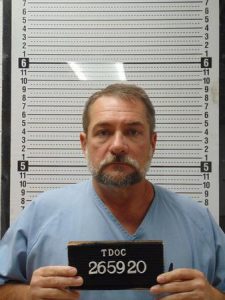News
Tatrow up for parole almost 29 years after murder conviction
March 4, 2025
By: Dwayne Page
A 57-year-old DeKalb County man serving a life sentence for first degree murder in the kidnapping and brutal killing of two men in 1995 will be up for parole next month.
The hearing for James Christopher Tatrow, convicted in the murders of John Harry and Roger Zammit, will be held April 8 at the Northwest Correctional Complex (NWCX) in Lake County at Tiptonville, Tennessee where Tatrow is incarcerated. Tatrow has spent half of his life behind bars because of the crimes.
This will be Tatrow’s third appearance before members of the Tennessee Board of Parole. His first was in October 2019.
“At the conclusion of Tatrow’s last parole hearing in April 2022, hearing officer Roberta Kustoff, a Parole Board member, cast her vote to decline parole for Tatrow due to the seriousness of the offense. The final decision came days later with at least four concurring votes of the parole board. “The file went to other parole board members who independently reviewed and voted until there were enough concurring votes to reach a final decision. In Tatrow’s case, there had to be four concurring votes by board members before a final decision was reached,” said Dustin Krugel, Communications Director for the Tennessee Board of Parole.
District Attorney General Bryant Dunaway and Zammit’s sister spoke out against parole for Tatrow during his last parole hearing in April 2022.
“Today, I attended the Parole Hearing for Inmate Christopher Tatrow and spoke in opposition to his release from prison,” said DA Dunaway in a prepared statement. “He was convicted by a Jury of the first-degree murder and especially aggravated kidnapping of two young men. John Allen Harry and Roger Dale Zammit. At the conclusion of the Parole Hearing, the hearing officer, a Parole Board member, cast her vote to decline parole due to the seriousness of the offense. John Allen Harry and Roger Dale Zammit were both murdered on January 29, 1995 in DeKalb County. The trial was held in Cumberland County. John and Roger were kidnapped, held against their will, beaten and tortured over a 3 day period. After their deaths their murderer threw their bodies into Center Hill Lake. Unfortunately, the family of violent crime victims must deal with their pain and grief for the rest of their lives. Roger Zammit’s sister testified today. Her pain was apparent. She stated that “sitting here and him being up for parole is shocking in itself. I have to go to a cemetery to talk to my brother. I have to come to this hearing and try to convince a system to not let the killer of my brother out of prison.” This horrible case devastated the Harry and Zammit families and continues to do so, even today. Please take a moment to remember John and Roger and lift them and their families up in prayer,” said DA Dunaway.
(Click the link below to read details about the Chris Tatrow case in this 1998 Tennessee Court of Criminal Appeals ruling)
The story centers around Tatrow, who was a rodeo cowboy, college student and family man until he started abusing drugs after a serious back injury.
In January 1995 Tatrow’s trailer home in the Belk Community of DeKalb County became a hangout house where friends and acquaintances of Tatrow came and went.
The beginning of the nightmare was when Tatrow returned home from a trip to Texas to find that his trailer had been robbed. Prize belt buckles won in rodeos, a Navajo blanket that belonged to a close friend, an antique knife collection, a coin purse inherited from his great-grandfather, a toolbox and several guns were reported stolen to the sheriff’s department but having heard rumors that Roger Zammit and John Harry were responsible for the theft, Tatrow allegedly decided to take matters into his own hands. Along with several accomplices, Tatrow kidnapped Harry and Zammit and brought them to his home where they were tortured and beaten for several days before being murdered. According to court documents, Zammit, gored and bloody, along with Harry, was made to kneel in a bathtub. A plastic bag was placed around Zammit’s head and a cord around his neck. Tatrow, the former Rodeo star, had his knee in Zammit’s back and yanked the cord, and then took a heavy-duty flashlight and mercilessly beat him. After Zammit died, Harry was marched outside where he was shot in the head and died. Tatrow and his accomplices then wrapped the bodies of Zammit and Harry in carpet and woven wire fencing and took them to Hurricane Bridge on Cookeville Highway where they were dumped from the bridge in the lake.
After Zammit and Harry were reported missing an investigation led to the discovery of the bodies and the arrest of Tatrow and his accomplices. Because of the pre-trial publicity, the trial court ordered that the case against Tatrow be tried in Cumberland County rather than DeKalb County. Other co-defendants in the case were sentenced after the Tatrow trial. While Tatrow admitted that he was involved in the kidnappings and that he killed the victims, he contended that because he was suffering from a drug-induced psychosis, he was unable to formulate the requisite knowledge of wrongdoing at the time the crimes occurred. The state argued that voluntary intoxication could not be used to negate the element of recklessness and that the evidence in the record demonstrated beyond a reasonable doubt that Tatrow knowingly kidnapped and then recklessly murdered the victims.
At the conclusion of the two-week trial in 1996, the jury convicted Tatrow of two counts of felony murder and two counts of especially aggravated kidnapping in the deaths of Zammit and Harry. Tatrow was also convicted of two counts of premeditated and deliberate murder of the same victims, but the trial court set aside those verdicts as the thirteenth juror. In the sentencing phase, the jury declined to impose the death penalty or life without parole and sentenced Tatrow to serve life sentences with the possibility of parole. At the conclusion of a sentencing hearing, the trial court judge ordered Tatrow to serve two consecutive life sentences concurrently with sentences of 22 years for the kidnapping convictions. Tatrow later challenged the validity of the convictions and the propriety of consecutive sentencing.
Upon a review of the record and the law, The Tennessee Court of Criminal Appeals in 1998 affirmed Tatrow’s convictions but vacated the order to run the two life sentences consecutively.
Friday night fire destroys home on Short Mountain Highway
March 4, 2025
By:
A Friday night fire destroyed a home on Short Mountain Highway
In a prepared statement, Chief Donny Green said “The DeKalb County Fire Department responded to a report of a fully involved residential fire Friday night at approximately 10:49 p.m. at 9088 Short Mountain Highway”.
“Firefighters quickly arrived, but found the home heavily involved with fire, the roof already collapsed, and high winds that were fueling the fire and making control efforts more challenging. Firefighters were able to quickly rescue threatened pets behind the home and protect an exposed vehicle and the nearby woodland”.
“None of the residents were at home. One firefighter did sustain minor injury during the incident. The cause of the fire is undetermined at this time”.
“The DeKalb County Fire Department’s Short Mountain Highway, Main, Keltonburg, and Belk stations responded to the scene, along with the department’s Rehabilitation Unit, DeKalb County Sheriff’s Department, and DeKalb County Emergency Medical Services,” said Chief Green
City Establishes Tiny Home Regulations (View Video Here)
March 4, 2025
By: Dwayne Page
Regulations have now been established for Tiny Homes under a zoning ordinance amendment which was adopted on second and final reading during Monday night’s regular monthly meeting of the Smithville Mayor and Aldermen.
Up until now, the City of Smithville had no “Tiny Home” regulations in a residential zone. One tiny home has already been located on Juniper Lane in an R-1 residential district.
In January, the Smithville Planning Commission voted to send a regulation recommendation to the mayor and aldermen for adoption. It was also suggested by the city’s building inspector.
Under the zoning ordinance amendment, Tiny Homes will be permitted only in the R-2 district as a use permitted and defined as anything 727 square feet or below restricted to only one tiny home per parcel by right. More than one tiny home (per lot) must be subject to mobile home park regulations and submitted with a site plan. Tiny homes will also be subject to the city’s international residential codes including existing setback requirements.
During Monday night’s mayor and aldermen meeting, City Administrator Hunter Hendrixson read the ordinance amendment before the vote.
“Whereas the Smithville Municipal Planning Commission has forwarded its recommendation to the city council regarding the amendment to the zoning ordinance of Smithville. The zoning ordinance is hereby amended, and the following definition shall be added: A Tiny Home is defined as a single-family dwelling that consists of a structure that is less than 727 square feet. Tiny Homes shall be allowed in the R-2 district as a permitted use. If there is more than one Tiny Home on an individual lot then the mobile home park regulations established would apply with a required site plan,” said Hendrixson.
Under the same ordinance amendment, zero lot lines are permitted upon appeal for multi-family residential dwellings in all districts except R-1 (low density residential).
Also included in the ordinance amendment is a provision that requires two off street parking spaces per apartment unit paved with hard surfacing for any future apartment building.
During the public hearing, city property owner Steven Cantrell asked the mayor and aldermen if they had considered other concerns not addressed in the proposed tiny home requirements.
“I have four questions for your consideration before your final vote,” said Cantrell. The proposed amendment defines a Tiny Home as a dwelling that consists of a structure that is less than 727 square feet”.
“First, I was wondering what that really means. For example, Appendix Q, Section AQ lO2 of the Intenational Residential Code states a Tiny House is considered a dwelling that is 400 square feet in floor area or less, excluding lofts,” said Cantrell.
“So, is your 727 feet the ground footprint or total square footage?”
“Second, why is there no minimum square footage identified? For example, l believe Warren County requires a minimum square footage of 138 square feet. Should the city ordinance have a minimum square footage. And if not, why not?”
“Third, are there any restrictions in any other parts of the City’s zoning or should it be here, that addresses minimum occupancy square footage?”
“Knoxville requires 120 square feet for one person occupancy, 320 feet for 2 people occupancy. And the maximum number of occupants cannot exceed three”
“Lastly, are Tiny Homes only going to be allowed in R-2 districts and if so, should that be clarified?”
For example, under Etowah, Tennessee’s ordinance. There is a minimum of 800 square feet in Residential zones and a minimum of 600 square feet in Residential 2 and 3 zones”, said Cantrell
City attorney Vester Parsley responded to Cantrell’s questions.
“We did not consider the number of square feet per person. We took the recommendation of our planning officer (Tommy Lee) and he advised that this was similar to other cities of our size,” said Parsley.
The aldermen did not make any further changes to the amendment based on the points Cantrell raised.
Meanwhile, the aldermen approved Mayor Josh Miller’s recommendation that members be appointed or reappointed to the Smithville Industrial Development Board including Bill Gash and Gina Denman who will serve two-year terms and Tim Stribling, Alan Webb, and Tom Janney who will serve new four-year terms.
During the public comments period at the beginning of the meeting Monday night, Cantrell also spoke out against a contract approved last month between the city and Blue Line Solutions, LLC of Chattanooga to provide camera monitored school zone traffic.
Under the contract already approved and signed by the city, school zones in Smithville will soon be camera monitored to catch motorists exceeding the speed limit.
Last month the aldermen voted to enter into a two-year contract with Blue Line Solutions to install new lights and signage in the school zones at Northside Elementary on Highway 56 north, DCHS/DeKalb Middle School on Highway 70, and at the DeKalb Christian Academy on Highway 56 south. The new radar feedback signs and flashing warning lights on pedestals are expected to be in place and operational by the start of the 2025-26 school year this fall.
Similar to automated license plate readers, Blue Lines’ laser-based LiDAR technology provides precise automated speed enforcement, ensuring that only vehicles violating speed limits are cited. ASETs identify vehicles and capture their speed through the use of a laser beam. The cameras capture the tag number of vehicles traveling over the speed limit in school zones. Violators are then sent a citation in the mail. The penalty is a $50 fine but unlike a ticket issued by law enforcement agencies, the citation is considered a civil infraction and can’t go against a driver’s record or insurance. The city and Blue Line Solutions will split the revenues from payment of fines. The citations may still be challenged in the Smithville Municipal Court.
According to the agreement, there will be no cost to the city except for an initial investment for a traffic study (estimated $15,000) which is to be reimbursed by Blue Line. After the study, Blue Line will install the equipment and recoup its cost over time from the city’s share of fine proceeds.
For the first 30 days of operation, violators will be sent only warning letters. Following that 30-day period citations will be issued to those who have exceeded the 25 miles per hour school zone speed limit by at least 11 miles per hour (36 mph) but only after a review of each case by the Smithville Police Department. No citations will be issued from this system when school is not in session or at other times of the day or night.
Cantrell questioned why the city held no public hearing on this proposal before taking action.
“I was disappointed that the City did not have a Public Hearing for the Speed Camera contract before you approved it with the contractor. For example, clarifying that any revenue generated from the cameras may only be used for traffic safety purposes and cannot be allocated to the general budget—TN State Law, and an issue the State closely monitors,” said Cantrell.
“Since the public was not allowed to ask questions, as I requested to do, my public concerns went unanswered. For example, $40,000 per location (3 locations) for signage which will be paid for from the city’s $25 dollar take. That’s $120,000 divided by $25 which translates into 4,800 paid tickets required for the city to break even”.
“The contract is for 2 years and there are 180 school days per year for a total of 360 ticket days. I won’t break it down further into hours in which a ticket may be issued, but it obviously reduces your window even more, for example the Christian school is posted for a total of 1 hour per day,” Cantrell continued.
“4,800 tickets divided by 360 days = 13.33 tickets per day to break even on the signage cost at the end of two years”.
“Do city/county/state records reflect we are issuing that many tickets a day? And if the cameras do their job and truly reduce speeding then the amount of ticket revenue will be reduced, and the city will owe money at the end of two years,” Cantrell explained.
“Let’s compare an officer issued ticket to an unattended speed camera ticket”.
“The shock of a driver and their driving habits is impacted by an officer issued citation in a school zone on that day—lesson learned immediately (think insurance, drivers record) and other drivers immediately take notice”.
“However, with a speed camera ticket, the owner of the vehicle, not necessarily the driver, gets the ticket in approximately 20 days,” said Cantrell.
“In addition, per TN law, each camera citation shall have printed on it, Non-payment of this [notice or citation] cannot adversely affect your credit score or report, driver license, and/or automobile insurance rate. As a result, some, especially out-of-state and non-county drivers may elect to ignore the tickets. And a speed camera where the local public understands the camera won’t click in until 36 MPH does not promote school safety. However, professional officers do…but then their job is to promote/ensure community safety, not raise revenue, which is what Blue Line Solutions primary purpose is,” said Cantrell.
“As for Blue Line Solutions, I don’t have first-hand knowledge of the company or if the city initiated contact or the company did. However, I am sure the city did a thorough review of the company’s record in Georgia and Louisiana. And compared them to other companies before signing the contract. However, my research on the company and its record, raised questions for this taxpayer”.
“This is why I believe public hearings are important,” said Cantrell.
« First ‹ Previous 1 20 28 29 3031 32 40 130 2570 Next › Last »











